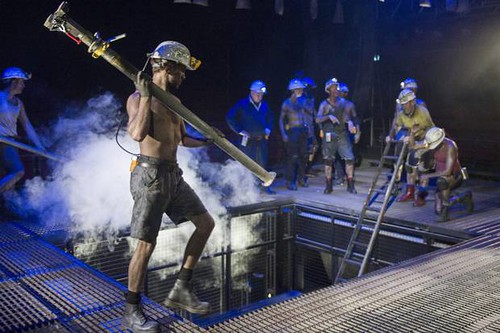Life is ticking over fairly pleasantly these days. The show I production managed on my return from Russia has finished its run, but I’m back at the same theatre doing some relatively low-key administrative work over the summer months. It’s an undemanding way to spend my days while still keeping a bit of money coming in. I’m also zeroing in on the next big international job too, but you’ll have to wait to hear about that one. And I'm looking at canal boats... In the mean time, I thought it’s been a long time since we talked about words, so today I’m digging out a few fun phrases that we haven't covered yet, starting with one that's got particular resonance for me, considering the show I just finished.
"On the coal face" = Similar to "on the shop floor". Refers to doing the actual work involved in a job, as opposed to planning or talking about it. Construction workers are at the coal face; architects are not. But it can also be used more broadly when standing around the water cooler, as in "That new CEO is a right wanker. He's got no idea what it's like for those of us on the coal face."
"Putting the boot in" = Kicking someone when he's down. As in, "Too right about the new guy, mate! Did you see that last memo he sent out? Closing the canteen, after they announced pay cuts? That was really putting the boot in!"
"Swings and roundabouts" = Shorter form of the complete phrase "What you lose on the swings, you gain on the roundabouts." Describing a situation when there are as many advantages as disadvantages. Somewhat similar to "six of one, half a dozen of the other". Our disgruntled boys at the coal face might not like the fact that the canteen has closed, but if it means they eat fewer plates of pie and chips it might just do them some good so, you know, it's all swings and roundabouts.
"Gordon Bennet!” = A mild expression of surprise, used in polite company to replace earthier expressions. Similar to saying “Taking the mickey” or “Taking the Michael” instead of saying “Taking the piss.” There’s much debate about which historical Gordon Bennet is immortalised in the saying. The two most popular candidates are a Scottish-born journalist and his playboy son, both of the same name. Then again, it’s quite possible the phrase doesn’t actually refer to a real figure and is simply a drawn out and sanitised version of “God” or “Gawd.” Indeed, a study of the etymology of the phrase would really require someone for whom English idioms was a Specialist Subject.
“Specialist Subject” = Ooooooo! This is some classic modern British pop culture this is, coming from the long-running BBC tv quiz show “Mastermind”. (Not to be confused with the popular board game with coloured pegs from the 1970s). BBC’s version has been running since 1972, and is known for its challenging questions, intimidating aura and big black chair. In the first round of the show, each of four contestants takes a seat under a bright spotlight in the famous chair to answer a series of questions on a topic of their choosing, called their “specialist subject”. A point is awarded for each correct answer given in a set period. In the second round contestants answer a series of general knowledge questions and the person with the highest score after two rounds wins. Winners go on to compete in later shows, and must nominate a new specialist subject for each new show.
The range of topics covered by peoples’ specialist subjects is vast and eclectic and has included Flag of the World, The Life and Works of Gilbert and Sullivan, the History of Lancashire Cricket Club, the Lifecycle and Habits of the Honeybee, the Franco-Prussian War, Doctor Who, and the Films of Jim Carey, the last of which produced the worst score in the history of “Mastermind, a shatteringly dismal ONE POINT, scored by Simon Curtis of West Yorkshire. (Though in fairness this was the second appearance by Mr. Curtis, who won a previous show answering questions on the rock band The Jam.) In any case, the phrase “specialist subject” has passed into the vernacular and is now used most often in a tongue-in-cheek way, as in “Oh yes, I’m quite good at opening beer bottles with my eye socket. It’s my specialist subject.”
"Blot one's copybook" = To tarnish one's reputation. As in, “She really blotted her copybook with me when I saw her staggering up the train platform in a miniskirt and bare feet last Tuesday morning. She’d obviously been out on the tiles.”
“Out on the tiles” = One in a long long long list of phrases to do with drinking and being drunk. To be out on the tiles is to be out drinking at pubs, parties, night clubs, etc… (See also “on the lash”, “on the piss” etc…) Possibly from Ireland, where pubs are often tiled, but really who cares? Used thusly: “I've been out on the tiles all night and I’m bursting! I need to spend a penny."
“Spend a penny” = Use the toilet. In fairness, this is an old euphemism that’s not really in use anymore other than by ladies of a certain age (who are unlikely to have been out on the tiles, but give me a bit of poetic license ok?) It derives from the fact that it used to take a penny to open the locks on public toilets for women. Men’s urinals were free; I suppose the authorities realised that attempting to force men to pay to use a public facility would be the barest folly. As for the phrase, its death knell was tolled in 1977 when prices went up and the Daily Telegraph headlined an article “2p to spend a penny”. And that was in new money, not old money.
“What’s that in old money?” = Referring to the decimalisation of the pound sterling, which took place on February 15, 1971. Prior to that date, a pound was made up of 240 pence, with 12 pence in a shilling and 20 shillings in a pound. Of course. And don’t get me started on farthings and crown and guineas. Ok, too late. A farthing was a quarter of a penny (or half a ha’penny). A crown was 5 shillings, and a guineau was one pound and one shilling. Bloody hell. They might as well have been dealing in brass knuts and silver sickles. In any case, it was a cause for great debate and consternation when they decided to do away with all that malarky and simply divide the pound into one hundred pence and be done with it. Thus, the question, “What’s that in old money?” Everyone’s pretty much got the one hundred pennies thing figured out these days, so the phrase is now applied in any situation when unfamiliar units of measure are used. For instance, “What a gorgeous day! It’s supposed to get up to 31 degrees!” “31 degrees? What’s that in old money?” Or, “150 grams of flour? What’s that in old money?"
And that’s all I’ve got for you this week. Stay tuned for news on upcoming work, and to find out whether I buy a canal boat!
"On the coal face" = Similar to "on the shop floor". Refers to doing the actual work involved in a job, as opposed to planning or talking about it. Construction workers are at the coal face; architects are not. But it can also be used more broadly when standing around the water cooler, as in "That new CEO is a right wanker. He's got no idea what it's like for those of us on the coal face."
My boys on the coal face in "Wonderland"
"Swings and roundabouts" = Shorter form of the complete phrase "What you lose on the swings, you gain on the roundabouts." Describing a situation when there are as many advantages as disadvantages. Somewhat similar to "six of one, half a dozen of the other". Our disgruntled boys at the coal face might not like the fact that the canteen has closed, but if it means they eat fewer plates of pie and chips it might just do them some good so, you know, it's all swings and roundabouts.
The Swindon "magic roundabout". Gordon Bennett! What twisted freak devised this abomination?
“Specialist Subject” = Ooooooo! This is some classic modern British pop culture this is, coming from the long-running BBC tv quiz show “Mastermind”. (Not to be confused with the popular board game with coloured pegs from the 1970s). BBC’s version has been running since 1972, and is known for its challenging questions, intimidating aura and big black chair. In the first round of the show, each of four contestants takes a seat under a bright spotlight in the famous chair to answer a series of questions on a topic of their choosing, called their “specialist subject”. A point is awarded for each correct answer given in a set period. In the second round contestants answer a series of general knowledge questions and the person with the highest score after two rounds wins. Winners go on to compete in later shows, and must nominate a new specialist subject for each new show.
The range of topics covered by peoples’ specialist subjects is vast and eclectic and has included Flag of the World, The Life and Works of Gilbert and Sullivan, the History of Lancashire Cricket Club, the Lifecycle and Habits of the Honeybee, the Franco-Prussian War, Doctor Who, and the Films of Jim Carey, the last of which produced the worst score in the history of “Mastermind, a shatteringly dismal ONE POINT, scored by Simon Curtis of West Yorkshire. (Though in fairness this was the second appearance by Mr. Curtis, who won a previous show answering questions on the rock band The Jam.) In any case, the phrase “specialist subject” has passed into the vernacular and is now used most often in a tongue-in-cheek way, as in “Oh yes, I’m quite good at opening beer bottles with my eye socket. It’s my specialist subject.”
The famous black chair, where Simon Curtis blotted his copybook.
“Out on the tiles” = One in a long long long list of phrases to do with drinking and being drunk. To be out on the tiles is to be out drinking at pubs, parties, night clubs, etc… (See also “on the lash”, “on the piss” etc…) Possibly from Ireland, where pubs are often tiled, but really who cares? Used thusly: “I've been out on the tiles all night and I’m bursting! I need to spend a penny."
“Spend a penny” = Use the toilet. In fairness, this is an old euphemism that’s not really in use anymore other than by ladies of a certain age (who are unlikely to have been out on the tiles, but give me a bit of poetic license ok?) It derives from the fact that it used to take a penny to open the locks on public toilets for women. Men’s urinals were free; I suppose the authorities realised that attempting to force men to pay to use a public facility would be the barest folly. As for the phrase, its death knell was tolled in 1977 when prices went up and the Daily Telegraph headlined an article “2p to spend a penny”. And that was in new money, not old money.
Naturally, they also took ha'pennies.
And that’s all I’ve got for you this week. Stay tuned for news on upcoming work, and to find out whether I buy a canal boat!







0 Comments:
Post a Comment